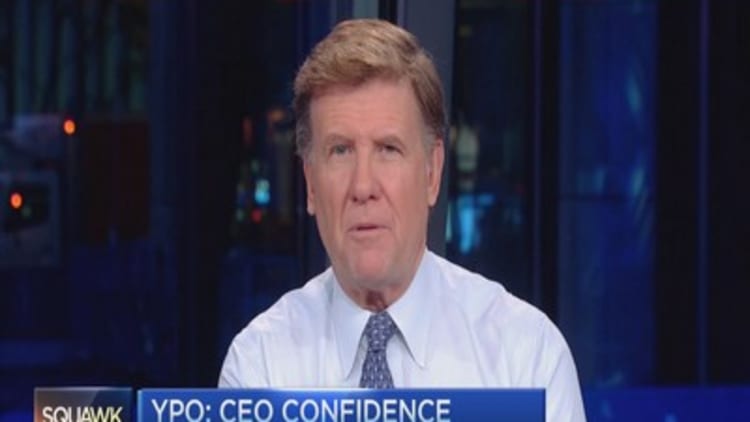
Chief executive officers are less confident about economic conditions in every major region across the globe, according to a quarterly survey of top business executives.
The U.S., while the strongest market globally, is not immune. Confidence in the U.S. dropped for the third consecutive quarter, according to the latest Young Presidents' Organization (YPO) Global Pulse survey.
The erosion in confidence results from the belief among CEOs that the global economy has softened in the past six months and will continue to weaken six months from now.
In July, 37 percent of CEOs said that the economy had improved in the previous six months. In the just-completed October survey, it slipped to 31 percent. Looking ahead, the dip in confidence is similar. In July, 44 percent of survey respondents thought the economy would improve in the next six months. By October, 9 percent fewer CEOs thought that was likely to happen.
The U.S. Index fell 2.9 points in October, to 59.9, a reading that suggests moderate growth in the quarters ahead, according to Stephen Slifer, YPO Global Pulse economic advisor and chief economist at NumberNomics.
The Global CEO Index fell 2.8 points to 58.1. The steepest decline among the nine global regions surveyed was Asia, where confidence dropped 4.7 points to 57.3.
"Fears about the extent of the slowdown in the Chinese economy, its impact on developing countries in Asia, the drop in commodity prices and the ongoing debate about the timing of the Fed's first rate hike are taking a toll," Slifer said.
The reversal in Asian regional confidence marks a significant, but not surprising, reversal in what had been the globe's biggest growth story out of the financial crisis. Five years ago, confidence in Asia was consistently five to 10 points higher than the Global Index. But developments in China have brought expectations back into line with the rest of the world. The outlook for Asia is not "bleak," Slifer said, but simply not as euphoric as it once was.
A reading of more than 50 in the YPO Global Pulse Index indicates a positive outlook, while below 50 indicates a negative outlook, so the higher the number, the more positive the outlook.
Confidence in the European Union fell 1.4 points in October to 60.2, which Slifer attributed to the belief that slower growth in Asia was effectively countered by further easing measures by the European Central Bank, a sharp decline in the value of the euro, and the stimulative impact caused by falling gasoline prices.
From 2009–2013, E.U. confidence was consistently five to 10 points lower than the Global Index due to the various debt crises in European countries.
Falling commodity prices have slammed Latin America, where confidence fell to 49.6, slipping below the key 50 index-reading threshold — the only global region to decline below the baseline for a positive outlook. Oil-exporting nations, like Brazil, Venezuela and Ecuador, have pushed the regional economy into recession.
Business confidence in Africa fell to an all-time low for the YPO Global Pulse survey of 54.3 and experienced the third-largest decline overall among regions in the third quarter, behind non-E.U. Europe and Asia.
The decline in confidence across the globe is influencing key decisions at corporations, from hiring to spending, but major declines are not yet being seen.
The employment index dipped 1.9 points to 59.0, but that remains only a point below the highest reading for this business cycle. And with the exception of Latin America, employment prospects around the globe remain a relative bright spot.
The investment outlook dropped 2.5 points to 58.6, but that still suggests investment opportunities are being considered, Slifer said.
Among sectors, sentiment declined slightly in construction, but the bulk of the dip was from firms in manufacturing and services. The declining confidence was equal across large, medium and small firms.
Looking out 12 months, CEOs remain optimistic about growth potential for their businesses, with the sales index falling 2.6 points, but still at a highly positive reading of 65.3.
Survey methodology: The latest quarterly YPO Global Pulse Index survey was conducted during the first two weeks of October, gathering answers from 1,899 chief executive officers across the globe, including 797 in the U.S. Globally, 27 percent of participants are from large companies (more than 500 employees), 39 percent from medium-sized companies (100–500 employees) and 34 percent from small companies (less than 100 employees). By business sector, 25 percent of participants are from the production sector, 10 percent from construction and 65 percent from the services sector.
CNBC and YPO (Young Presidents' Organization) have formed an exclusive editorial partnership consisting of regional "Chief Executive Networks" in the Americas, EMEA and Asia-Pacific. These Chief Executives Networks are made up of a sample of YPO's global network of 20,000 top executives from 120 countries who are on the frontlines of the economy and run companies that collectively generate $6 trillion in annual revenues.







